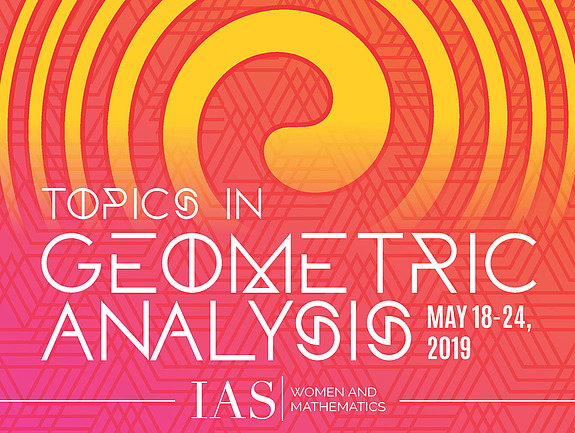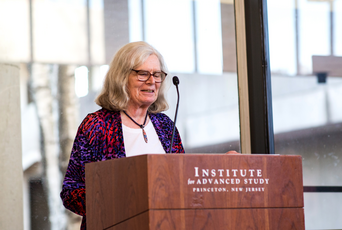Women and Mathematics 2019 to Explore “Topics in Geometric Analysis”
Press Contact

The Women and Mathematics Program (WAM) at the Institute for Advanced Study, which recently received the 2019 award for “Mathematics Programs that Make a Difference” from the American Mathematical Society, will welcome 51 women from 40 institutions around the world to engage in a unique 7-day program that continues to empower, challenge, and inspire female students and early-career mathematicians to excel in the field. Based on the theme “Topics in Geometric Analysis,” participants this year will explore dynamic shapes and surfaces along with the equations that describe these structures with talks on singularity models for geometric flows and perimeter minimizers in geometric measure theory, among other topics. Marking its 26th anniversary, WAM will take place from May 18–24, 2019, on the Institute campus.
WAM 2019 focuses on two main themes in geometric analysis: regularity of minimizers and geometric flows. In the Terng Lecture Series, Tatiana Toro from the University of Washington will discuss fundamental ideas arising in perimeter minimization. “These concepts will be presented from a standpoint that makes the results applicable in several different settings,” stated Toro. In the Uhlenbeck Lecture Series, Panagiota “Toti” Daskalopoulos from Columbia University, will discuss ancient solutions to several different geometric flows. “These solutions play a key role in understanding the singularities of the flows,” Toro adds. “We are looking forward to an exciting and inspirational week.”
A special memorial exhibition, “Remember Maryam Mirzakhani,” commissioned by the International Mathematical Union’s Committee for Women in Mathematics, will be on display at the Institute for the duration of WAM to honor the memory and legacy of Maryam Mirzakhani, pathbreaking mathematician, Fields Medalist, and Member (2015) in the School of Mathematics.
“WAM is an integral part of the IAS mission, continuing to mentor, train, and inspire young women to shape the future of mathematical research,” stated IAS Director and Leon Levy Professor Robbert Dijkgraaf. “While a mathematics education is cultivated in the classroom, a career as a mathematician is dependent on forging professional connections and exposure to a diversity of ideas. Fortunately, the IAS Women and Mathematics program provides participants with access to all of the above.”
Cofounded by frequent Member and Visitor Karen Uhlenbeck and fellow Member Chuu-Lian Terng in 1993 as part of the Park City Mathematics Institute, WAM was established on the Institute’s campus in 1994. Since that time, Uhlenbeck and Terng have mentored hundreds of young women mathematicians through the program, resulting in a powerful network of nearly 1,500 participants to date.
“It is absolutely thrilling that we will be viewing the Abel Prize award ceremony live during the program and celebrating Abel Prize winner Karen Uhlenbeck, one of the founders of WAM,” added Professor Margaret Readdy. Uhlenbeck is the first woman to receive this top mathematical honor, which she will accept in Oslo on May 21.
The 2019 program is organized by former Members in the Institute’s School of Mathematics: Sun-Yung Alice Chang, Eugene Higgins Professor of Mathematics at Princeton University; Dusa McDuff, Helen Lyttle Kimmel ’42 Professor of Mathematics at Barnard College, Columbia University; and Margaret Readdy, Professor of Mathematics at the University of Kentucky.
WAM is grateful for renewed funding from the National Science Foundation as well as generous support from Lisa Simonyi and Princeton University, which enables WAM to enact many new initiatives to continue its mission to recruit and retain more women in mathematics.
For press interested in covering the Women and Mathematics Program, please contact Lee Sandberg at lsandberg@ias.edu. For more information on Institute sponsored events, visit www.ias.edu/events.
About Women and Mathematics
The Women and Mathematics Program (WAM) at the Institute for Advanced Study is an annual program with the mission to recruit and retain more women in mathematics and to unite women mathematicians at various stages of academic development including undergraduate, graduate, postdoctoral, and research mathematicians for a unique and enduring mentoring experience. While WAM is dedicated to addressing gender imbalance and success rates among women in the mathematics field, the greatest achievements of WAM will be reflected in the groundbreaking discoveries enabled by a mathematical community that reflects the full diversity of our society and leverages collective knowledge and imagination.
About the Institute
The Institute for Advanced Study is one of the world's foremost centers for theoretical research and intellectual inquiry. Located in Princeton, N.J., the IAS is dedicated to independent study across the sciences and humanities. Founded in 1930 with the motto "Truth and Beauty," the Institute is devoted to advancing the frontiers of knowledge without concern for immediate application. From founding IAS Professor Albert Einstein to the foremost thinkers of today, the IAS enables bold, nonconformist, field-leading research that provides long-term utility and new technologies, leading to innovation and enrichment of society in unexpected ways.
Each year, the Institute welcomes more than 200 of the world's most promising researchers and scholars who are selected and mentored by a permanent Faculty, each of whom are preeminent leaders in their fields. Comprised of four Schools—Historical Studies, Mathematics, Natural Sciences, and Social Science—IAS has produced an astounding record of introducing new understanding and is responsible for undeniable progress across disciplines and generations, from the development of one of the first stored-program computers to the establishment of art history as a discipline in the United States. Among its present and past Faculty and Members are 33 Nobel Laureates, 42 of the 60 Fields Medalists, and 18 of the 20 Abel Prize Laureates, as well as many MacArthur Fellows and Wolf Prize winners.


